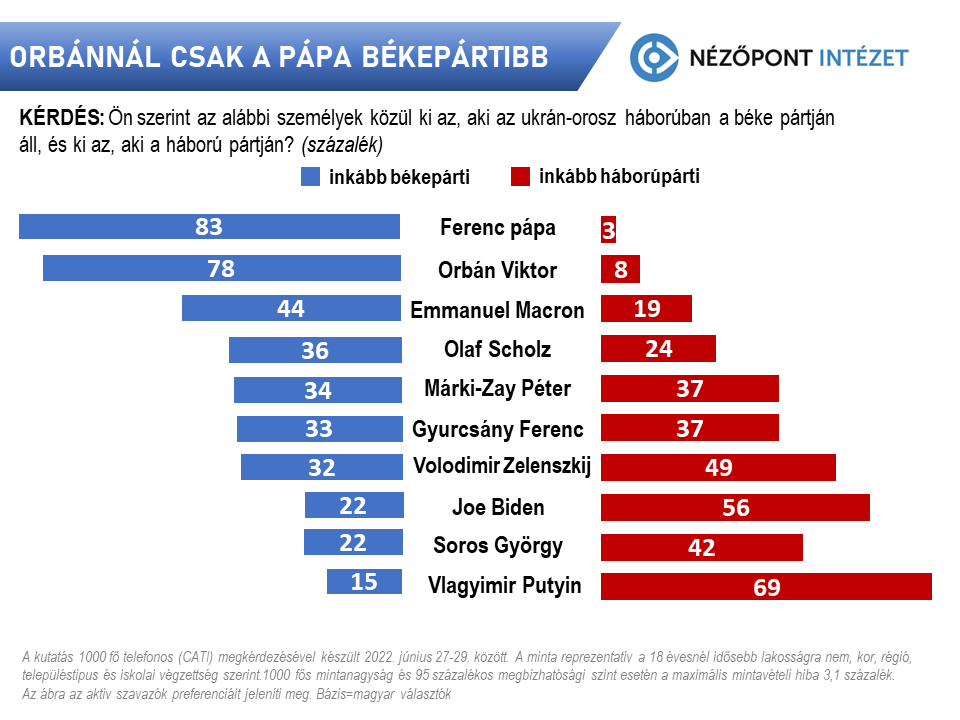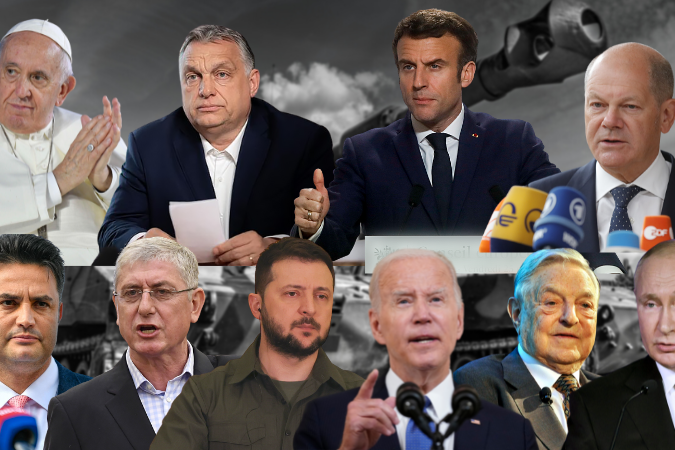Four-fifths of Hungarians (78 percent) think that Viktor Orbán is on the side of peace, and only Pope Francis (83 percent) is more likely to think that he supports a ceasefire, while less than half of Hungarians think the same about Western leaders, according to the public opinion of the Nézőpont Institute. -research, the results of which were announced on Thursday.
They wrote that the effects of the four-month-long Russian-Ukrainian war are not only suffered by Ukraine, but the economic consequences of the conflict affect the entire world in the form of wartime inflation. An important question is how leading politicians and international players act to find a solution, they noted.
June 27-29. According to a telephone survey of 1,000 people, four-fifths (78 percent) of Hungarian voters believe that Viktor Orbán is on the side of peace, and only 8 percent believe that he is more pro-war. There is agreement on this issue among pro-government and anti-government voters. In both camps, there are a majority of those who assume the Prime Minister is pro-peace, 91 percent of Fidesz voters, and even 58 percent of left-wing voters agree with this.
"This high rate is not surprising, since the Hungarian Prime Minister is the only head of state in Europe who openly advocates for peace"
they wrote.
All in all, only Pope Francis (83 percent) thinks that he supports a ceasefire, and only 3 percent think otherwise.

Citizens' assessment of politicians' pro-peace approach
Source: Nézőpont Institute
The judgment of the leaders of European countries that support arms shipments and embargoes is more nuanced:
French President Emmanuel Macron is also thought by more people (44 percent) to be more on the side of peace than those who think he prefers armed conflict (19 percent). In the case of German Chancellor Olaf Scholz, the proportion of those who suspect that he is in favor of peace is more moderate (36 percent) and the circle of those who suspect that he is in favor of war is wider (24 percent).
According to the Nézőpont Institute, Hungarian voters share the same opinion regarding the role of Péter Márki-Zay and Ferenc Gyurcsány among the Hungarian opposition leaders. Only a third of them think that Márki-Zay (34 percent) and Gyurcsány (33 percent), who often campaigned with war messages after the outbreak of the war, are pro-peace, and a higher proportion of voters, 37-37 percent, think that they are on the side of war - they added to it.
According to the vast majority of Hungarians, those who support the war include the President of the United States of America, Joe Biden, who is the most supportive of sanctions policy and arms shipments (56 percent), and György Soros, who also proposes sanctions to defeat Russia (42 percent). Only 22 percent think that both people want to promote peace.
Among the parties to the war, 32 percent of Hungarians believe that Ukrainian President Volodymyr Zelensky is more in favor of peace, while one and a half times as many think that he prefers armed conflict (49 percent).
"Voters clearly consider Vladimir Putin to be the leader who promotes peace the least (15 percent) and the leader who supports war the most (69 percent)," the statement emphasized.
MTI
Cover image: Nézöpont Institute
